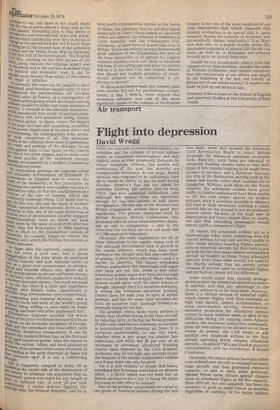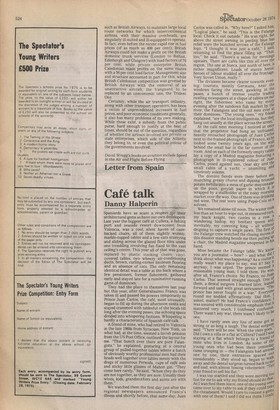Air transport
Flight into depression
David Wragg
While the demands of nationalised industry for subsidies and the collapse of private airlines might be considered commonplace, and only slightly more so than pessimistic forecasts by major American airlines, the events and predictions of the past few months are exceptionally disturbing. At one stage, British Airways was supposed to be sufficiently hard up to doubt its ability to pay its staff during October. America's Pan Am has asked for subsidies totalling £80 million and its rival, TWA, _ has also admitted difficulties, and although less serious these are important enough for the two airlines to talk about 'co-operation.' On this side of the Atlantic, two British independent airlines have gone into liquidation. The private enterprise rival to British Airways, British Caledonian, has proposed talks on route rationalisation—meaning an end to competition — and in the meantime has cut back services and made 800 of 5,700 employers redundant. Obviously the main explanation for all of these difficulties is the rapidly rising cost of fuel, although the complete lack of growth in the tourist industry, which has been most marked at the cheaper end, has also contributed greatly. A third factor also exists — and it is harder to identify, The major scheduled airlines,.particularly the Americans, will argue that fares are too low, while a few other scheduled airlines argue that fares are too high _and travel is being discouraged. Many charter airlines would agree with the latter school of thought, although the .Civil Aviation Authority is raising the minimum advanced booking charter fares for next year in spite of airline protests, and has for some time attacked the costs on inclusive tour 'package' holidays as generally being far too low.
The problem which faces many airlines is simply that of either trying to fill their aircraft by reducing fares, or facing the bleak prospect. of still lower load factors following an increase in international and domestic air fares. It is certainly questionable, to say the least, whether there is any scope for charter fare reductions, and while the 30 per cent or so increases in minimum advanced booking charter fares imposed by the Civil Aviation Authority may be too high, any attempt to put the finances of the smaller independent airlines on a firmer basis can only be good.
Yet it is only realistic to accept that heavy scheduled fare increases could have an adverse effect — a factor which has not been lost on British Airways or the CAA, in fixing the latest increases to take effect in January.
Part of the problem can probably be traced to the greed of American airlines during the last two years, when they pressed the American Civil Aeronautics Board to reject British proposals for advanced purchase excursion fares. Basically, such fares are identical to advanced booking charter fares in that both types of fare require booking to,be made three months in advance, and a minimum fourteen day stay at the destination, putting both in the family and tourist rather than business travel categories. Without such fares on the North Atlantic, the scheduled airlines have given traffic to charter airlines and have been unable to fill the vast empty spaces on modern airliners, since it is seldom possible to obtain a full load in both directions. Leaving a costly aircraft idle on the ground is not an economic answer either, because of. the high rate of depreciation and heavy airport dues, or, worse, the fact that intending passengers would merely catch a competitor's flight.
Of course, the scheduled airlines are at a disadvantage today when competing with the charter airlines, for not only are they unable to offer cheap advance booking flights, particularly on American aircraft, but they have to put up with the fact that many charter airlines have aircraft as 'modern as those flying scheduled services. Even when older aircraft are used by the charter airlines, they are merely earlier versions of aircraft used on scheduled flights, and the layrhan cannot tell the difference.
Some would argue that existing arrangements protect the scheduled airlines excessively anyway, and that any advantage to the charter airlines is to be welcomed. However, there is a certain amount of essential traffic which charter flights, with their emphasis on high load factors, cannot accommodate, or even contemplate serving. Nevertheless, excessive protection for scheduled airlines cannot be easily justified when, in spite of the difficulties facing the existing trans-Atlantic carriers, the American authorities continually press for newcomers to be allowed on to these routes. At present, the CAB wants to add .another two American airlines to the four already operating North Atlantic scheduled services — in spite of TWA and PanAm plans for rationalisation, and the withdrawal of British Caledonian.
Obviously, the major airlines have also either over-ordered new aircraft or retained too many older aircraft, and thus generated excessive capacity, to add to their other problem-s. Market forces alone dictate special cheaper fares on scheduled flights to fill this capacity. More difficult, but also apparent, has been the tendency to grab as many routes as possible, regardless of viability, or for major airlines,
such as British Airways, to maintain large local route networks for which intercontinental airlines, with their massive overheads, are singularly ill-suited and ill-equipped to operate. In fact, even before the recent rapid rise in fuel prices (of as much as 400 per cent), British Airways could not make a profit on the British domestic trunk services (London to Belfast, Edinburgh and Glasgow) with load factors of 70 per cent, while private enterprise British Caledonian made profits on the same routes with a 56 per cent load factor. Management size and structure accounted in part for this, while British Caledonian competition was greeted by British Airways with the removal of an unattractive aircraft, the Vanguard, to be replaced by an uneconomic one, the Trident One.
Certainly, while the air transport industry, along with other transport operators, has been a victim of unprecedented increases in fuel prices, and poor economic conditions generally, it also has many problems of its own making. While these exist, a subsidy from the public purse, hard enough to justify at the best of times, should be out of the question, regardless of whether the airlines involved are private or state enterprises, which side of the Atlantic they belong to, or even the political colour of the governments involved.
David Wragg's books on aviation include Speed in the Air and Flight Before Flying











































 Previous page
Previous page